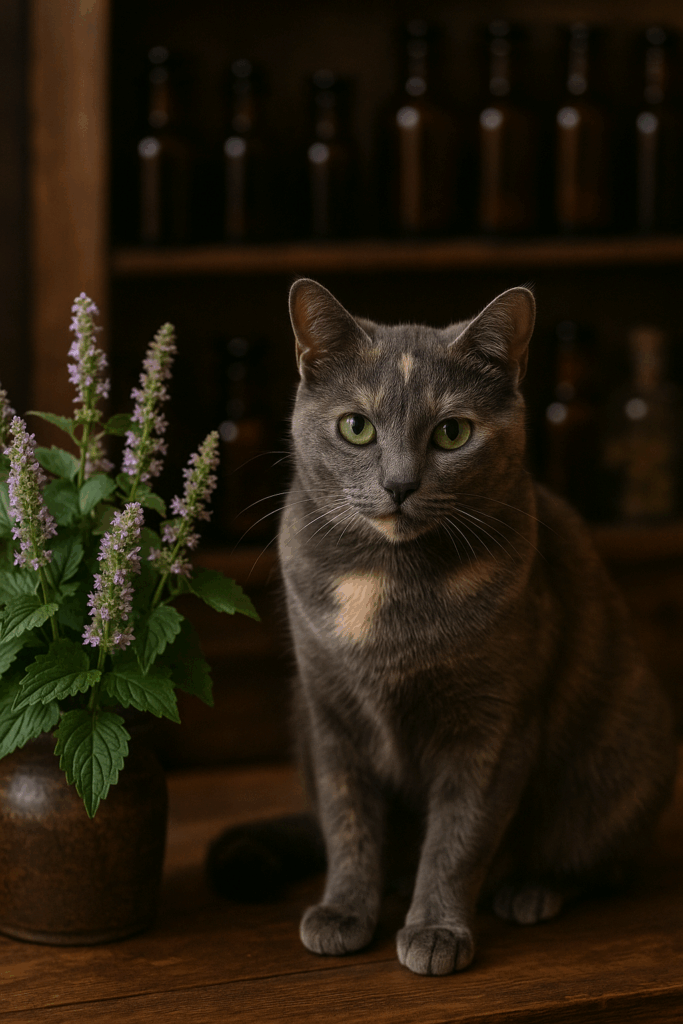Greetings from the bricks.
by Lucy
Reflections from a cat who tried to rule the yard—and settled into something deeper.
The Quiet Watcher

I’m Lucy. You may not see me first, but I see you. I like to keep low to the ground, tail curled just so, ears forward. I’ve tried to claim the yard a dozen times, but territory shifts like wind through lemon balm. Still, I hold my place—quiet, still, unbothered.
That’s why I love patchouli.
What Is Patchouli?
Patchouli (Pogostemon cablin) is a fuzzy-leaved herb in the Lamiaceae family—the mint family. But don’t expect it to smell like mint. This one speaks in low tones—earthy, musky, and warm.
It doesn’t sparkle or shout. It grounds. It holds.
The essential oil is extracted through steam distillation of dried leaves and stems, preserving its rich scent and therapeutic properties (Lawless, 2013). The result is a dark amber oil with an aroma that deepens as it ages—just like the wisdom earned by watching and waiting.
Patchouli’s Chemistry and Benefits
The main components of patchouli essential oil include:
- Patchoulol – known for anti-inflammatory and regenerative properties
- α-Bulnesene and α-Guaiene – sesquiterpenes that contribute to its grounding effect
These make patchouli ideal for:
- Skincare – Especially for dry, irritated, or mature skin
- Emotional balance – Helps reduce nervous tension and mental clutter
- Meditation – Encourages stillness and centered presence
- Blending – A strong base note that anchors lighter scents
Maggie adds patchouli to her skin oil because it works—and I can see the calm it brings.
Favorite Blends
Maggie’s favorite pairings include:
- Lavender (Lavandula angustifolia) – to soothe the nervous system
- Sweet Orange (Citrus sinensis) – to brighten moods
- Vetiver (Vetiveria zizanoides) – to deepen grounding
Patchouli doesn’t compete. It supports, like a shadow under a sunbeam.
Safe Use and Pet Precautions
Safety is essential, especially around cats.
Patchouli is generally safe for humans when properly diluted in a carrier oil (Price & Price, 2012). But for cats? No essential oil is truly safe. Our bodies can’t break down many of the compounds in oils—especially phenols, ketones, and terpenes.
Even diffusing can overwhelm a cat’s sensitive respiratory system or cause liver toxicity over time.
Maggie never uses oils around me or my clowder. She keeps her lids tight and stores bottles high. She says a good scent should never overpower—it should invite. That’s a lesson every nose should learn.
Patchouli at Home: Simple Uses
Here are a few gentle ways humans can enjoy patchouli:
- In a body oil: Blend 4 drops patchouli in 1 tablespoon jojoba or hemp seed oil
- In a diffuser (for pet-free zones): Try 2 drops patchouli, 2 drops lavender, and 1 drop orange
- In a bath oil: Mix with a neutral carrier and add to warm water (never apply undiluted)
Let patchouli be your reminder to slow down. To soften. To still the noise.
A Final Thought from the Shade
So if your thoughts are racing, your energy scattered, or your feet feel far from the ground, patchouli might be your plant.
Trust the stillness.
Walk your edge quietly.
That’s where patchouli lives.
— Lucy
References
Lawless, J. (2013). The encyclopedia of essential oils: The complete guide to the use of aromatic oils in aromatherapy, herbalism, health, and well-being. Conari Press.
Price, S., & Price, L. (2012). Aromatherapy for health professionals (4th ed.). Churchill Livingstone.
